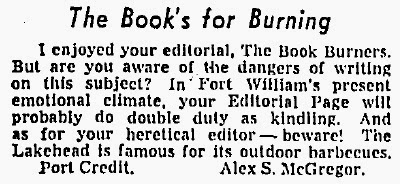I possess one of the finest collections of Ronald Cocking material in private hands. Yes, I do. What's more, it was amassed in a matter of minutes.
There is a cautionary tale in this, recounted in my review of
Die With Me, Lady. It will not be repeated it here. In its place, I offer these words of advice: Do not judge an oeuvre on eight pages of text.
Now, the collection:
ITEM #1
A glossy 6¼ x 8¼ black and white photograph (above) depicting the author at ease. A refugee from the defunct Miami News, I purchased this photo for US$5.33. The obverse appears to indicate that the image was published on 4 November 1951, a Sunday.
 |
| (cliquez pour agrandir) |
It was through this item that I discovered Cocking had once served as Managing Editor for
The Hamilton News. The caption reports that
J. Arthur Rank is "dickering for movie rights" to one of his three novels. Wish I knew which.
ITEM #2
A first edition of The House on Brooke Street (London: Hurst & Blackett, 1949), Cocking's first novel. "Written in the best 'Clubfoot' tradition", says the jacket, but I doubt I'll ever read it. Published sixty-five years ago at 8s. 6d., I paid £20 for my copy.
ITEM #3
High Tide is at Midnight, subject of
my most recent post. Published by Hurst & Blackett in 1950, this is a first edition of Cocking's second book. This one, originally 9s. 6d., was purchased for £26.
ITEM #4
A second edition copy of Cocking's third and final novel, Weep No More, Lady, published in 1953 by the Mystery Book Guild. This one was a bargain at £7. The first edition was published in 1952 by Hurst & Blackett.
ITEM #5
Weep No More, Lady recast as
Die With Me, Lady for the Canadian news stand. Published in June 1953 by Harlequin, it was this copy – more precisely, the first eight pages of this copy – that led me to drop C$147.10 (incl. shipping) on the above.
Oh, but didn't those eight pages show such promise!
Addendum: What do I know about Ronald Cocking? Not much ore than is found on the back of that glossy black and white. To be perfectly frank, I haven't been much inspired to take that ninety-minute drive out to Hamilton to see what I might find.
The laziest of searches, conducted from the comfort of my home office, finds Cocking twice mentioned in The Globe & Mail. Nothing to do with his books, mind. Here's the first, in Bruce West's column of 17 July 1950:
Cocking returned to the pages of
Globe & Mail in this 7 June 1952 report from Osgoode Hall:
What else? What else? Well, let's see… That W. stood for William. He was born in 1907 at Portsmouth, and served in the RAF during the Second World War. Cocking emigrated to Canada, but at some point returned to the UK, where he contributed to Parade and Argosy. He died at Surrey in 1999.
Oh, and it seems he did know his canines. The last piece of Cocking fiction I've been able to find is "It's a Dogs Life!", published in the August 1971 issue of Argosy.
I'm not interested in buying a copy.
Related posts:




























